Real estate is the most substantial asset class globally, with a staggering valuation exceeding $230 trillion. It’s a dynamic sector that attracts entrepreneurs and investors, offering compelling benefits such as consistent long-term income streams, potential financial appreciation, and attractive tax incentives.
At Defy Mortgage, we offer 75+ non-traditional and tailored loan options for all types of borrowers. Whether you’re a first-time real estate investor, self-employed individual in the market for a new home, or a homeowner looking to take advantage of built-up equity, we have the tools and expertise to help.
Drawing from our years of experience helping investors reach their real estate investment goals, we’ve put together this collection of real estate investing tips that every investor should know—especially those just starting out. Although we cannot give explicit financial advice, we can draw on our experience and expertise in the mortgage industry to help guide you in the right direction.
Real estate investing is a powerful pathway to financial empowerment, offering an exciting opportunity to take control of your economic future. With the right knowledge and strategy, even challenges can turn into stepping stones for success. Let these essential real estate investing tips be your guide, helping you navigate the market with enthusiasm and skill, and setting you up to build wealth and achieve your financial goals.
Remember, it’s also important for you to do your research, speak with your lender of choice and discuss with your financial advisor before making any real estate investment decisions.
Understand Your Investment Goals
Of all the real estate investing tips out there, the most important one is to define your investment objectives clearly. Are you seeking long-term rental income or short-term profits through property flipping? How you should approach property selection and your overall investment strategy will largely depend on your goals.

Ask yourself these questions in order to understand your investment goals:
What type of investment property am I looking for?
Determine whether you’re interested in residential, commercial, or other types of income-generating property. If you’d like to purchase residential real estate, consider whether you’d prefer a single-family home or multi-family property. Multi-family homes can potentially generate more income than single-family homes, but single-family homes typically require less upfront capital and can be less complex to manage.
Because each property type involves its unique risks, it’s important to have a clear idea of what you would like to take on. Understanding the pros and cons of each will help inform your decision.
What is my timeframe?
How soon do you want to see returns on your investment? Short-term ventures like fix-and-flips generally offer quick returns. These loans allow you to focus on acquiring undervalued properties, renovating them, and selling them at a higher market value for a fast turnaround.
On the other hand, holding properties long-term allows you to weather market fluctuations while benefiting from gradual appreciation. While the returns aren’t immediate, this approach requires less active involvement.
Building a portfolio of rental properties strikes a good balance between the two. It lets you earn rental income while holding properties long-term, with the option to sell a rental property once its value becomes profitable. It also allows you to diversify your total investment and cover different locations and property types.
Do I understand the definitions and importance of property appreciation and rental income?
Property Appreciation refers to the increase in the value of a property over time. This can happen due to factors like market demand, improvements to the property, or overall economic growth in the area. Appreciation builds equity, which can be leveraged for loans or realized as profit when the property is sold.
Rental Income is the regular cash flow earned from leasing a property to tenants. It provides a steady stream of income that can be used to cover expenses like mortgage payments, maintenance, and taxes while also contributing to overall financial stability and growth.
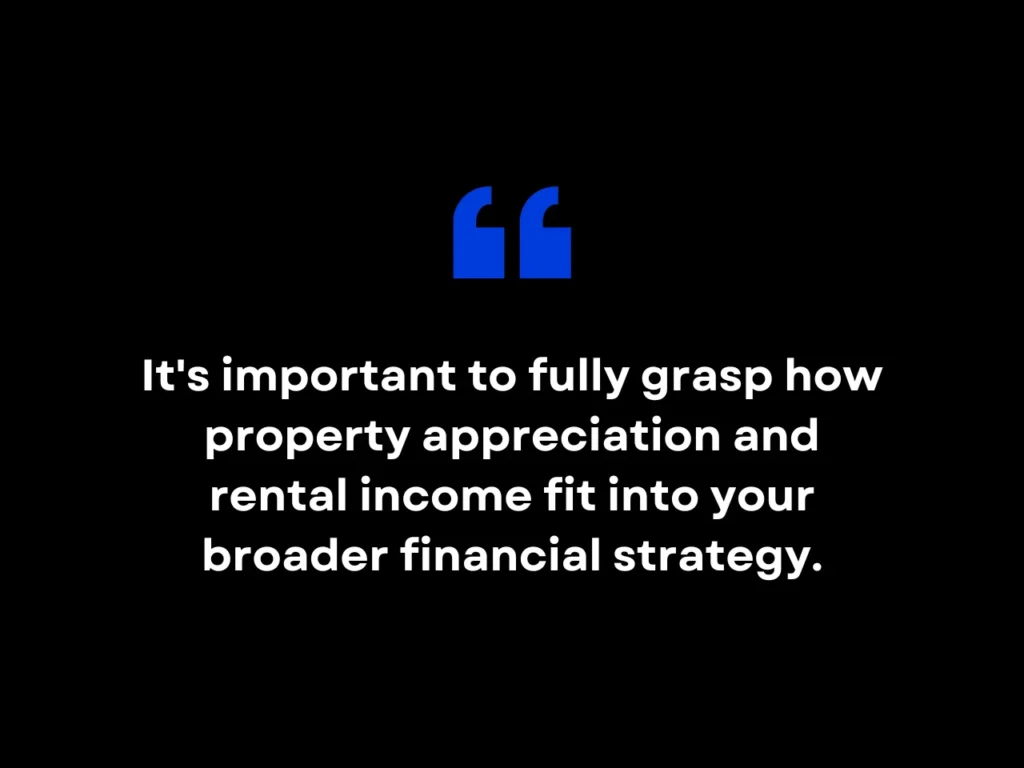
It’s important to fully grasp how property appreciation and rental income fit into your broader financial strategy. As each property’s market value rises, so does your borrowing power, which you can tap into with options such as home equity loans, home equity lines of credit (HELOCs), and cash-out refinances to finance just about anything.
Meanwhile, collecting consistent rental income can strengthen your personal financial profile. With this, it’s possible that you can gain access to more financial tools to fund further growth, such as bank statement loans and P&L loans. Strong cash flow also gives you more working capital to put in your investments in general, as well as makes you more attractive to investors and other partners.
Would a short-term rental property benefit me more?
Short-term rental (STR) is worth considering, especially if you are investing in areas that receive visitors. Many choose to work with property management companies that take care of the bulk of the work when it comes to real estate maintenance. Despite talks of the short-term rental market cooling off, it’s still growing at a steady rate and is expected to reach a valuation of $8.9 billion by 2026.
If your property is located in an attractive area that can get booked out during the high season, it can be easier to secure loans such as DSCR, which are qualified using your property’s projected rental income. Think of areas where many would like to vacation or visit, like areas in Hawaii, California, Georgia, etc. Be sure to research local regulations and work with STR-savvy lenders, as touristy areas tend to have stricter permit requirements.
Does my chosen investment align with my finances?
If you find yourself asking this question, you’re already on the right path. Start by assessing your risk tolerance, available capital, and profit expectations. Explore the financing options available to you and work with experienced and trustworthy lenders. If you have limited financing options, creative financing methods such as the BRRRR (Buy, Rehab, Rent, Refinance, and Repeat) can be a great asset.
Keep in mind that even with thorough research, all investments carry some level of inherent risk. The goal is to find the right kind of investment within your financing ability that works with your available capital and profit expectations, without taking on too much risk. Be sure to speak with your financial advisor or wealth manager about your finances and goals surrounding your investment property before finalizing anything.
Key Real Estate Investing Tips To Keep In Mind
Once you have a solid grasp on your real estate investment goals, you can begin planning how to make your first acquisition and make it profitable. Here are some important investing tips to keep in mind:
Research the Real Estate Market
Determining the viability of your investment involves rigorous research. Your long-term gains depend on understanding the income potential of your investment properties. Whether your income depends on resale value or rent rates, it’s imperative that you grasp the various market dynamics and pressures that move them:
- Location: Locational characteristics that can affect your income potential include population growth, job growth, schools, cultural and outdoor attractions, and environmental factors.
- Property Prices and Trends: Look at historical real estate values to get a general idea of the ebb and flow of property appreciation in the area.
- Rental Demand: Factors such as housing costs in an area and domestic migration patterns will tell you which areas will grow consistently in terms of rental demand in the near future.
- Future Developments: Upcoming infrastructure projects and the unveiling of new amenities or commercial hubs can also affect property values.
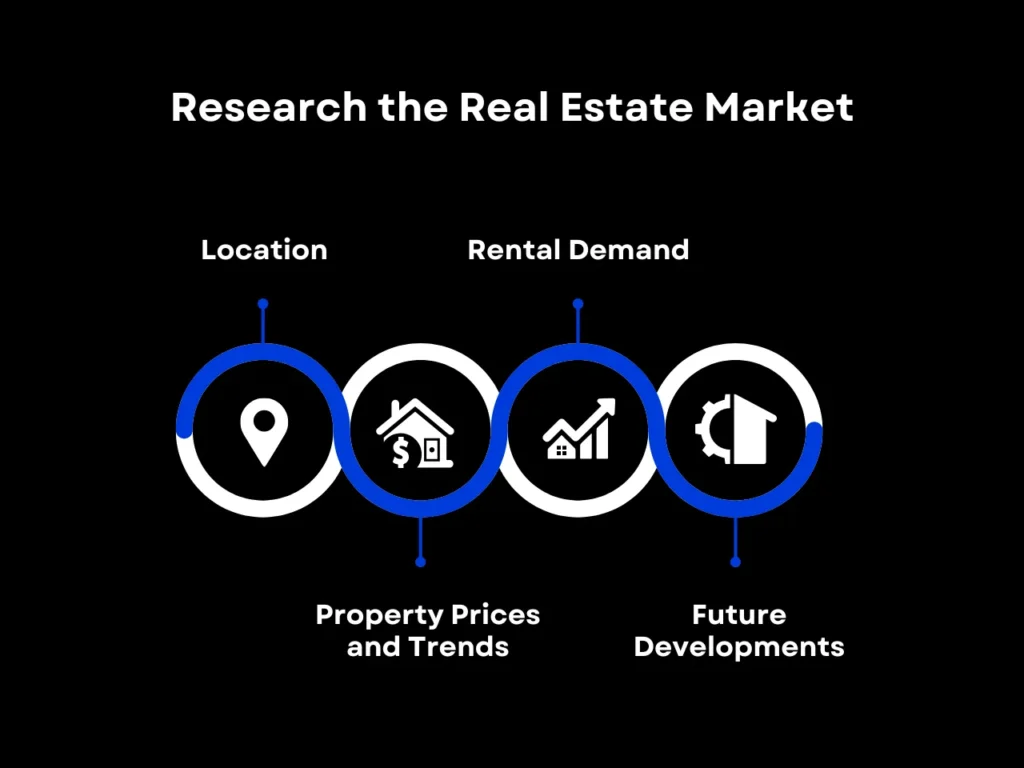
Familiarize Yourself With Real Estate Concepts and Terminology
You may already be familiar with common real estate terms, but do you have an in-depth understanding? Have you considered how HOA regulations may affect your investment? Are you educated on operating costs, inspection contingencies, and the nuances of property management? Continue to familiarize yourself with relevant terms that you may encounter and build a solid understanding as you go along.
Due diligence is especially important once you’ve identified a potential investment opportunity. You can avoid costly mistakes by taking the time to research and making smarter decisions. The more you know, the better equipped you’ll be to tackle challenges.
Start Small with a Manageable Property
You may be tempted to start off with a big investment, especially if you are confident that you can polish up a property with high appreciation potential and maximize your earnings. However, even if you’re well-versed in what’s involved in improving and managing properties, there are still several advantages to starting small:
- Lower Financial Commitment: Properties such as single-family homes or duplexes typically require less capital, minimizing your risk.
- Simplified Management: With fewer tenants and lower maintenance demands, smaller properties allow you to learn the ropes of property management with less stress.
- Valuable Learning Opportunity: Managing a smaller property provides the perfect environment to experiment, learn from any mistakes, and gradually prepare for larger investments.
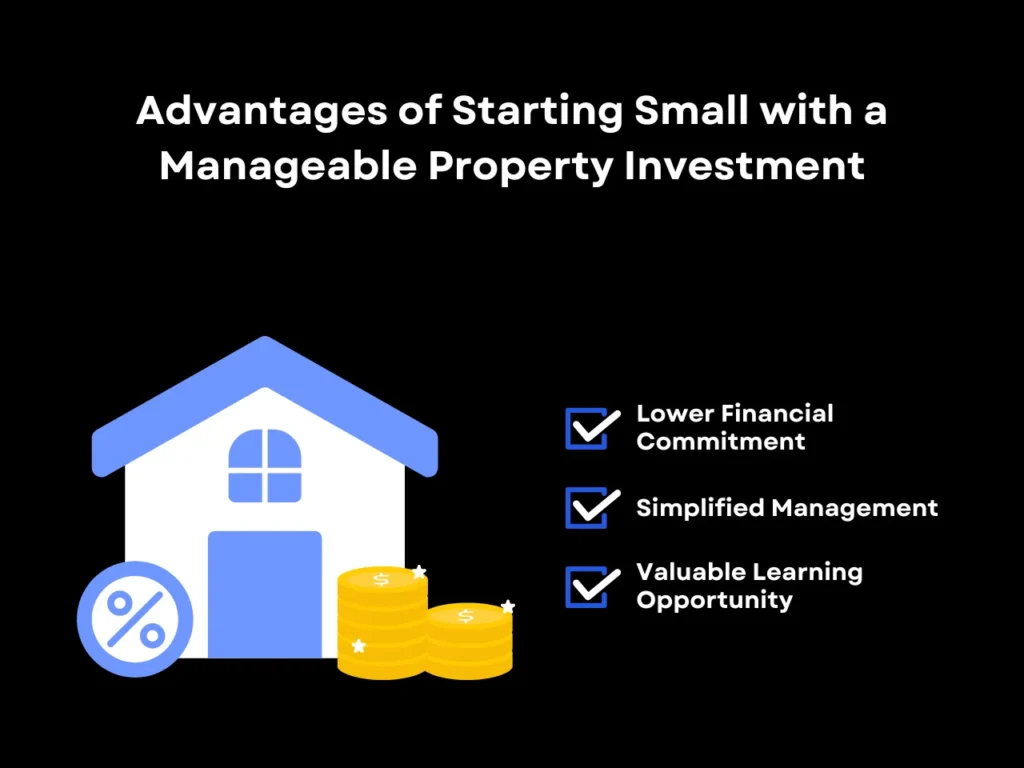
Prioritize Cash Flow Over Appreciation
While property appreciation is a positive for any real estate investment, focusing on immediate cash flow can provide you with more financial stability. A steady, positive cash flow not only covers your expenses but also provides a buffer against market fluctuations. Additionally, if you have enough cash saved up over time, you can reinvest it into future acquisitions.
This is one of the reasons why DSCR loans are well-suited for both beginner and seasoned investors. DSCR loans focus on the consistent cash flow potential of a property, offering better rates, loan amounts, and LTVs (up to 85% LTV at Defy depending on meeting certain requirements!) the better a property can perform at peak capacity. Moreover, there’s essentially no hard limit to how many DSCR loans you can have active at a time. This means that by selecting properties with great value potential in favorable local markets, you can get comparable terms to what you would get for a conventional loan with good credit, but without actually requiring you to have good credit. Paired with the absence of a hard limit on active loans, you can continue growing your portfolio–and thus, your cash flow– indefinitely, as long as you consistently select properties with high cash flow potential.
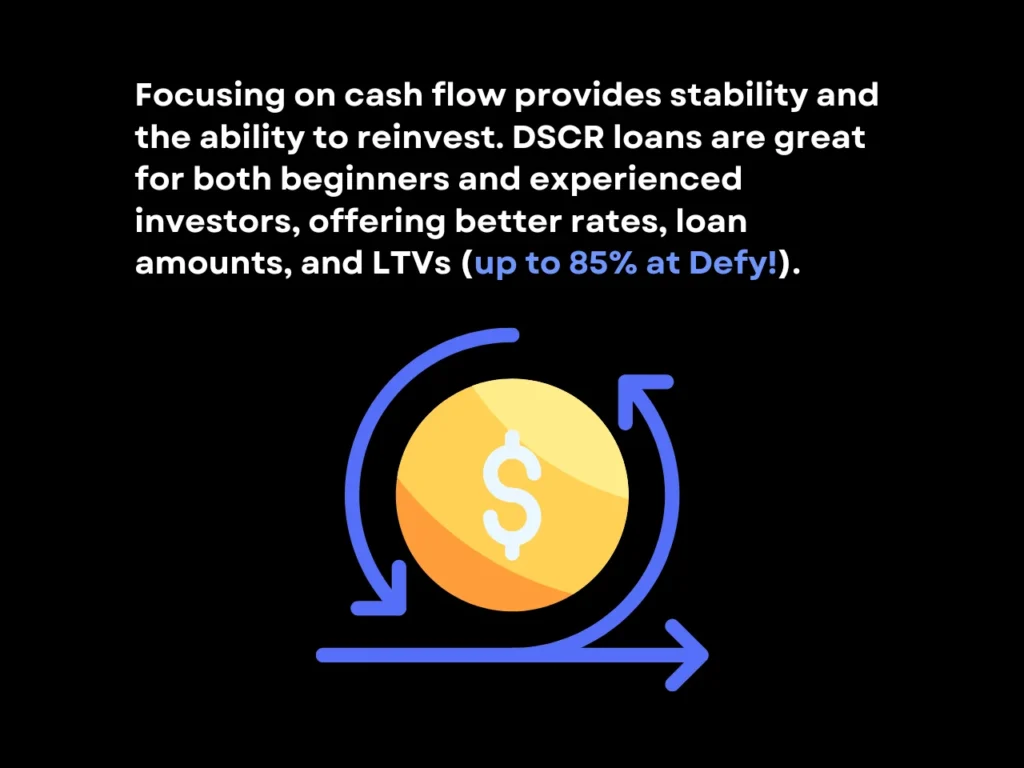
Do a Thorough Property Inspection
Before finalizing any purchase, you should arrange a comprehensive property inspection. This step helps uncover potential issues that could lead to unexpected expenses down the line or even depreciation of your property’s value.
Here are some important areas for inspections:
- Structural Integrity: Ensure that the foundation, roofing, and overall construction meet safety and quality standards.
- Systems Check: Verify that essential systems like plumbing, electrical wiring, and HVAC units are in good working order.
- Pest and Environmental Hazards: Identify any issues such as infestations or environmental hazards that might affect the property’s value or your liability.

Build a Network of Experts
Investors work best when they have knowledgeable individuals to bounce their ideas off of. Surround yourself with professionals who each have expertise that can streamline your process and enhance your investment decisions.
Cultivate these essential contacts:
- Financial advisors and wealth managers: We can’t give financial advice, but they can. Financial advisors are a great resource for you to ensure that your investment strategies are aligning effectively with your financial goals.
- Real estate agents: Agents stay on top of market conditions, and thus offer invaluable insights about promising locations and rising trends.
- Lenders: Choose financial partners who understand your strategy and can provide flexible financing options, like Defy. At Defy, we specialize in unconventional investment strategies, with loan options fully customizable from the ground up.
- Inspectors and contractors: Having go-to inspectors and contractors leads to better results. As inspectors become familiar with your investment criteria, they can spot red flags faster, and contractors can make better use of your time and budget.
- Mentors or coaches: Seasoned investors can share their experiences–both wins and setbacks–to guide you through your investment journey.
- Certificate program and classes: Real estate certificate programs are generally open to anyone, regardless of age, background, or current career, and are scheduled at times that are convenient for busy working professionals. Earning a certificate demonstrates your expertise, making you more attractive to investors and lenders. Classes like these are also excellent opportunities to build your network.
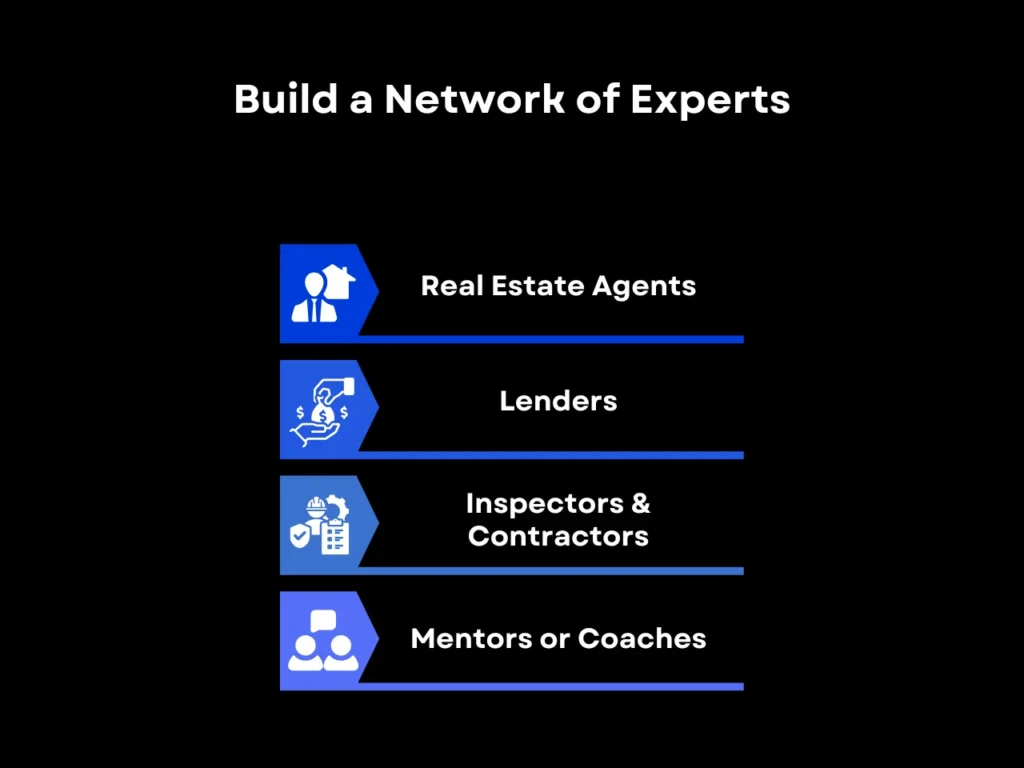
Consider Long-Term Investment Strategies
Planning for the future is a key aspect of successful real estate investing. Even if you mostly rely on short-term investments such as fix-and-flips, developing long-term strategies is key to ensuring sustained growth and profitability.
Here are some long-term strategic moves to consider:
- Reinvesting your profits: It’s wise to save up a portion of your income to fuel additional acquisitions, helping to secure a positive growth trajectory.
- Leveraging equity: Similar to redirecting profits, you can also tap into the equity built up in properties in your portfolio using a home equity loan, home equity line of credit (HELOC), or cash out refinance to fuel your continued growth. With enough equity, you can build out your portfolio to several properties in a short amount of time, making it all the more important that you’re strategically acquiring properties with a high potential to appreciate.
- Diversification: You can also use the equity you’ve stored and profits you’ve set aside to diversify into different types of real estate, locations, or even other investment types such as the stock market or bonds. A diverse investment portfolio better insulates you from market shocks since you’re not reliant on a single product or market.
- Long-term property flipping: Buying and holding can be much more lucrative than flipping the property as soon as it’s renovated. Besides gaining a significant amount of equity, you can also collect consistent rental income, adding to your overall cash flow. Plus, holding lets you choose the best moment to sell, eliminating the risk of having to offload your property when the market is uncertain.
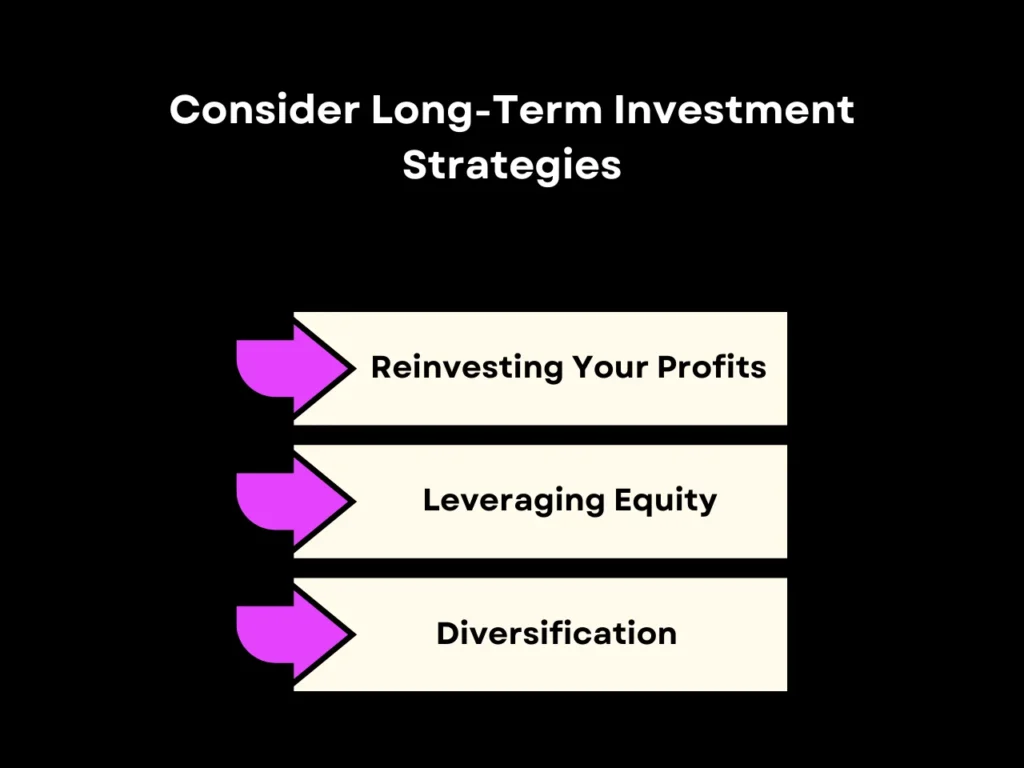
Real Estate Investing Tips FAQ
What is the best property type for first-time real estate investors?
Ultimately, it depends on your investment goals, but generally, single-family homes or duplexes are often ideal for beginners due to their lower cost and simpler management requirements.
How much money do I need to start investing in real estate?
The required capital varies based on location and property type. However, there are loan options with low down payments that make entry more accessible. You can also utilize creative financing tactics, such as the BRRRR method, to start investing in real estate with a nominal amount of money. Be sure to speak with your real estate agent and/or lender about your options.
How can I estimate cash flow before buying a rental property?
The cash flow that you’ll receive from your rental property is the net amount that you earn, subtracting all expenses such as mortgage, taxes, and vacancies. To estimate your cash flow, start with your expected rental income and subtract all operating expenses, including mortgage payments, taxes, insurance, and maintenance costs. You can use online tools or spreadsheets to model different scenarios.
A positive cash flow means that the rental property will be profitable, while a negative cash flow means that you’d need to set aside extra cash and work towards profitability. Be sure to consult experts and ensure that you’ve accounted for all relevant expenses.
Should I buy a fixer-upper or a move-in-ready property for my first investment?
Move-in-ready properties may be less risky for first-time investors, as they require less immediate capital and management. Fixer-uppers can offer higher returns but require more time, effort, and capital to get them to a point where you can sell or rent for a good margin.
What soft skills do I need for real estate investing?
Real estate investing involves various social and business interactions, where soft skills like communication, negotiation, and relationship building come into play. Beyond that, skills in research and organization help you formulate your investment strategy, and problem-solving and adaptability ensure that you execute it with minimal setbacks.
How do I know if a location is good for real estate investing?
Research local economic indicators, such as employment rates and population growth, and assess the demand for rental properties in the area. Ask locals for their opinions and speak with your lender and real estate agent about what they are seeing in that market.
Key Takeaway
Your first real estate investment doesn’t have to feel overwhelming. With a clear understanding of your financial goals and thorough research, you can identify the challenges that lie ahead and work to resolve them. Use what you’ve learned from our real estate investing tips every step of the way and make informed decisions.
As a first-time investor, leaving room to experiment can be invaluable, as it helps you acclimate to being in full control of your investment and everything that demands. Focusing on consistent cash flow over quick turnovers can help you gain a solid foothold in the real estate investing space and set yourself up for sustainable long-term growth.
Ready to take the next step on your journey? Speak with your financial advisor and reach out to Defy today, and let us help you plan your winning strategy with an investment property loan that’s right for you.







